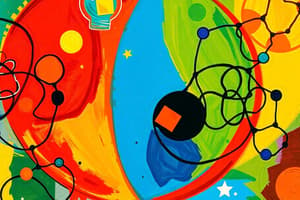Podcast
Questions and Answers
What is a fundamental principle that ensures scientific knowledge remains credible and trustworthy to the public?
What is a fundamental principle that ensures scientific knowledge remains credible and trustworthy to the public?
- Subjective interpretations of data
- Reliance on anecdotal evidence
- Obscurity in communication
- Transparent and reproducible communication (correct)
Which characteristic of science implies that scientific knowledge can change with new findings?
Which characteristic of science implies that scientific knowledge can change with new findings?
- Replicable
- Tentative (correct)
- Objective
- Based on empirical evidence
Which of the following best describes the requirement that scientific statements must be able to be proven wrong?
Which of the following best describes the requirement that scientific statements must be able to be proven wrong?
- Tentative
- Falsifiable (correct)
- Testable (correct)
- Empirical
What does it mean for scientific experiments to be replicable?
What does it mean for scientific experiments to be replicable?
How does objectivity contribute to scientific communication?
How does objectivity contribute to scientific communication?
What is the primary focus of life sciences?
What is the primary focus of life sciences?
Which step in the scientific method involves proposing a testable explanation?
Which step in the scientific method involves proposing a testable explanation?
What distinguishes scientific laws from scientific theories?
What distinguishes scientific laws from scientific theories?
What process involves asking questions and testing hypotheses?
What process involves asking questions and testing hypotheses?
Which of the following is NOT a branch of earth sciences?
Which of the following is NOT a branch of earth sciences?
Which method is used to predict the outcomes if a hypothesis is correct?
Which method is used to predict the outcomes if a hypothesis is correct?
What is an essential characteristic of scientific knowledge?
What is an essential characteristic of scientific knowledge?
In which channels do scientists primarily communicate their findings?
In which channels do scientists primarily communicate their findings?
Flashcards
Physical Sciences
Physical Sciences
Study of non-living matter and energy.
Earth Sciences
Earth Sciences
Study of Earth's structure, processes, history.
Life Sciences
Life Sciences
Study of living organisms.
Scientific Method
Scientific Method
Signup and view all the flashcards
Scientific Theory
Scientific Theory
Signup and view all the flashcards
Scientific Law
Scientific Law
Signup and view all the flashcards
Scientific Inquiry
Scientific Inquiry
Signup and view all the flashcards
Scientific Communication
Scientific Communication
Signup and view all the flashcards
Empirical Evidence in Science
Empirical Evidence in Science
Signup and view all the flashcards
Objectivity in Science
Objectivity in Science
Signup and view all the flashcards
Reproducibility in Science
Reproducibility in Science
Signup and view all the flashcards
Tentative Nature of Science
Tentative Nature of Science
Signup and view all the flashcards
Testable in Science
Testable in Science
Signup and view all the flashcards
Study Notes
Branches of Science
- Science is a systematic enterprise that builds and organizes knowledge in the form of testable explanations and predictions about the universe.
- It is broadly categorized into several branches, including:
- Physical sciences: Focus on non-living matter and energy. Includes physics, chemistry, and astronomy.
- Earth sciences: Study the Earth's structure, processes, and history. Includes geology, oceanography, and meteorology.
- Life sciences: Focus on living organisms. Includes biology, botany, zoology, and genetics.
- Social sciences: Study human society and behavior. Includes sociology, psychology, economics, and political science.
Scientific Method
- The scientific method is a systematic approach to acquiring knowledge. It involves several key steps:
- Observation: Identifying a phenomenon to study.
- Questioning: Asking specific questions about the observed phenomenon.
- Hypothesis formulation: Proposing a testable explanation.
- Prediction: Forecasting the outcome of an experiment if the hypothesis is correct.
- Experimentation: Designing and conducting controlled experiments to test the hypothesis.
- Data analysis: Interpreting the results of the experiment.
- Conclusion: Drawing conclusions based on the results, either supporting or refuting the hypothesis.
Scientific Theories and Laws
- Scientific theories are well-substantiated explanations of some aspect of the natural world. They are supported by a large body of evidence and are consistently tested. Theories are not just guesses but provide a coherent framework for understanding observations.
- Scientific laws describe fundamental relationships in nature. They are concise statements that summarize consistently observed phenomena. Laws do not explain why phenomena occur but describe how they occur.
Scientific Inquiry
- Scientific inquiry is the process of asking questions and testing hypotheses through an organized approach. It relies on critical thinking, skepticism, and evidence-based reasoning.
- Scientific knowledge is always subject to revision. New evidence or different interpretations can lead to modifications or advancements in scientific understanding.
Scientific Communication
- Scientists communicate their findings through various channels: peer-reviewed journals, conferences, presentations, and educational materials.
- Public communication of science is increasingly important to foster understanding and engage the public in scientific discussions. Transparency and reproducibility are key principles in scientific communication.
- Accurate and clear communication is essential to ensure that science is understood and trusted by the public.
Characteristics of Science
- Based on empirical evidence: Observations and measurements are the foundation for scientific knowledge.
- Objective: Free from personal biases and opinions, focusing on verifiable data.
- Replicable: Experiments and observations should be reproducible by other scientists.
- Tentative: Scientific knowledge is always subject to revision and refinement as new data emerges.
- Guided by natural laws: Scientific explanations must adhere to the fundamental concepts and principles of the natural world.
- Testable: Statements or hypotheses must be capable of being proven wrong (falsifiable) through rigorous testing.
Studying That Suits You
Use AI to generate personalized quizzes and flashcards to suit your learning preferences.




